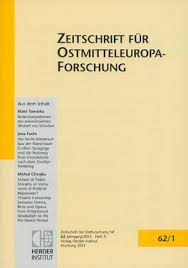Kontaminierte Erinnerung: Vom Einfluß der Kriegspropaganda auf das Gedenken an die Warschauer Aufstände von 1943 und 1944. Über Veränderungsprozesse in der polnischen und der deutschsprachigen Publizistik und Erinnerungskultur
Contaminated memory: The influence of war propaganda on the commemoration of the Warsaw uprisings of1943 and 1944. Transformation processes in Polish and German journalism and memorial culture
Author(s): Klaus-Peter FriedrichSubject(s): Communication studies, Military history, Political history, Social history, WW II and following years (1940 - 1949), Fascism, Nazism and WW II, Cold-War History
Published by: Verlag Herder-Institut
Keywords: Contaminated memory; war propaganda; commemoration; Warsaw uprisings of 1943 and 1944; Transformation processes; Polish and German journalism; memorial culture;
Summary/Abstract: In a twofold comparative approach, the author intends to discuss the basic tendencies that have changed the journalistic discourse on Warsaw’s two uprisings of 1943 and 1944 in Poland and in the German-speaking sphere. Press responses initially varied from (National Socialist) publishing bans and (Polish) victim discourses, which, in both cases, also referred to the Jewish victims of persecution. Only gradually was the national Polish uprising of 1944 to become a central issue in the People’s Republic of Poland and allowed to be discussed controversially. Early retrospective views in Germany and Austria were characterized by belittlement and the relief of guilt, which, even then, was criticized by the Swiss writer Max Frisch several times. Behind the new front lines of the Cold War, the West German discourse emancipated itself with difficulty from the distorted images of Nazi propaganda. With regard to the Jewish uprising of 1943, this was achieved earlier, while attempting to come to terms with the past. The fact that Germans were also guilty of crimes against Warsaw’s civilian population in 1944 was only hesitantly recognized towards the end of the post-war era. This change of perspectives, however, did not go along with a thorough, self-critical reflection of one’s own memorial attitude. In Poland, under the influence of National Communism, there developed a denial of the Jewish element and a political instrumentalizing of the memory dedicated to the ghetto uprising, which was not opposed until the age of Solidarity. In the Third Republic, the attitudes towards the two uprisings have been characterized by controversies and contradictions to the present day. So far, it has not been possible to have them integrated into a new model of Polish memorial culture that might be able to overcome old differences.
Journal: Zeitschrift für Ostmitteleuropa-Forschung
- Issue Year: 55/2006
- Issue No: 3
- Page Range: 395-432
- Page Count: 38
- Language: German

